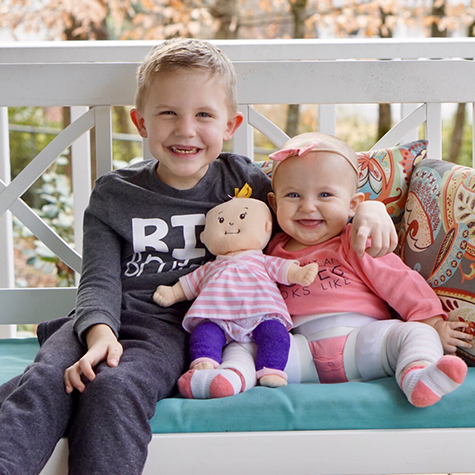Spica Cast
A special body cast know as a spica cast is prescribed for patients after hip surgery, like an open hip reduction surgery, or who are healing from a femur fracture. Your child's doctor may also prescribe a spica cast if they have developmental dysplasia of the hip, also called hip dysplasia, who have undergone a successful closed reduction surgery to put the hip back in the proper place.
Hip dysplasia can be present at birth or develop as your child grows. It describes a wide range of problems, such as a misshapen ball or socket, or a loose hip joint. It occurs in 1 in 1,000 births and can run in families or be caused by something in the baby’s environment in the mother’s womb.
A spica cast is a type of hard splint made of plaster or fiberglass. It surrounds an injured or repaired body part—in this case, the hip joint or joints—to help:
- Prevent movement.
- Protect the hip(s).
- Keep the hip(s) in a correct position until healed.
Your child’s doctor will talk with you about specific care for her cast. Below are general guidelines for caring for your child while she is wearing a spica cast and how best to care for the cast itself.

Quinn’s journey with hip dysplasia and a spica cast
Quinn was diagnosed with developmental dysplasia of the hip (DDH), also known as hip dysplasia. Our team of specialists helped correct her hips through surgery, casting and bracing.
Read Her StoryParents and caregivers will need to become familiar with how to best care for their child’s spica cast, from cleaning the cast to learning how to change a diaper while their child is wearing the cast.
It is important to:- Keep your child’s cast dry at all times.
- Give your child a sponge bath each day. Wash all her skin not covered by the cast with soap and water. Protect the cast with towels or plastic trash bags during a bath.
- Do not use lotions, oils or powders under or around the edges of the cast. They soften the skin, making it prone to irritation or breakdown, and can lead to infection. Powder may cake up and do the same thing.
- Check your child’s skin at least four times a day for redness and irritation.
How do I keep the cast clean during feeding time?
- Raise your child’s head up higher than her hips. Use pillows to raise her head and chest area as needed, or place her on her stomach with her head and chest raised.
- Cover the cast with a large T-shirt or towel during meals.
- Do not add new foods to your child’s diet during the first few weeks after surgery. This can help avoid vomiting and diarrhea (loose stools).
How do I change diapers and take my child to the bathroom?
- If your child is in diapers, tuck a disposable diaper smaller than the size she usually wears between her skin and the cast. The plastic backing should be next to the cast’s inside surface and the cotton side next to her skin. A sanitary napkin can also be placed inside the small diaper to absorb even more. Put a larger diaper around the cast keep it in place.
- Check diapers often and change as soon as soiled.
- For older children:
- Raise your child’s head slightly higher than her hips to help urine and stool drain downward. Use pillows to raise her head and chest area as needed.
- Boys can use a urinal.
- For girls, make a “wick” from several layers of toilet paper and place it over the bedpan so it directs the stream of urine into the bedpan or commode. This helps keep urine from splashing the sides of the cast.
How to position your child and take care of the spica cast
- Change your child’s position every two to four hours during the day and at least once a night. This helps keep pressure off the skin to help prevent pressure sores and skin problems.
- Never use the bar between the legs to move or lift your child. Doing so can damage the cast.
- Use pillows or rolled blankets for support.
- Small children may fit into a wagon or stroller padded with pillows.
- Older children can use a reclining (moveable back) wheelchair.
- A reclining outdoor lounge chair may be used as a portable bed.
- Avoid knocking the cast against things. Check often for cracks, breaks, dents, tightness or looseness. Call your child’s doctor right away if you notice any of these.
-
Spica Cast 101
This step-by-step instructional video details how to care for a child who is wearing a spica cast. If you have any questions, consult your child’s physician.
How can I help keep my child comfortable in a spica cast?
What can I do about itching?
- Do not let your child put anything inside the cast to scratch an itch. This could hurt her skin and lead to an infection.
- Change your child’s position often to shift the weight of the cast. Use pillows and rolled blankets to help keep your child comfortable. She can be on her back, side or tummy.
- Use a hair dryer to blow cool air under the cast.
- Distract your child by playing with her, reading books, listening to music, or watching TV or videos.
- Ask your doctor about medicine for itching if none of these remedies work.
What if my child is bored?
Your child can take part in many “quiet” activities, such as:
- Playing with toys. Make sure toys are big enough so they cannot get stuck inside the cast.
- Reading books, playing video games, watching TV, listening to music and storytelling.
- Working on art projects.
- Visiting with friends.
- Participating in family activities.
What about going to school and participating in outside activities?
- Contact your child’s teacher to arrange for a home study program. Otherwise, she can return to class as soon as she’s able.
- Your child can continue to participate in scouting activities, clubs and other social activities. She may also watch her team play at sporting events.
What about riding in a car?
- Before leaving the hospital, ask your hospital clinician about safety vests and special car seats made for children in spica casts.
- Seat your child in the back seat of the car in her car seat.
When should I call my child’s doctor?
Make sure your child’s spica cast is not too tight so blood can flow well to all body parts around the cast. Every eight hours, or more often if needed, be sure to check:
- Movement of your child’s toes and fingers: Have her move or wiggle her fingers and toes often.
- Sensation (feeling): Touch the area above and below the spica cast several times a day. Call your child’s doctor right away if she complains of numbness, tingling or pain.
- Blood flow (circulation): Press briefly on each of your child’s large toenails several times a day. When it turns white, let go. If the pink color does not return in three seconds, call your child’s doctor right away.
- Temperature: If one or both of your child’s feet are cold, cover them with a blanket or sock, or raise them above the level of the heart. Check it again in 20 minutes. If they are still cold, check feeling and blood flow. If you think there may be a problem, call your child’s doctor right away.
- Swelling: Look for swelling above and below the spica cast several times each day. A little swelling is normal, but a lot of swelling is not. If there is severe swelling, raise the affected area higher than the level of the heart for an hour. Watch it closely and call your child’s doctor if the swelling does not go down.
- Pain: If your child’s pain is different than what she had before or if the medicine ordered does not help her pain, call your child’s doctor right away.
We also recommend calling the doctor if your child experiences:
- Changes in skin color above or below the cast
- Skin that becomes red or irritated
- Sores
- A bad smell from inside the cast
- A new blood stain on the cast two or more days post-casting
- A fever higher than 100.5°F for longer than 24 hours with no other symptoms
- A loose, broken, cracked or softening of the cast
- A wet cast that does not dry completely
- Something stuck in the cast
Support on Facebook
This content is general information and is not specific medical advice. Always consult with a doctor or healthcare provider if you have any questions or concerns about the health of a child. In case of an urgent concern or emergency, call 911 or go to the nearest emergency department right away. Some physicians and affiliated healthcare professionals on the Children’s Healthcare of Atlanta team are independent providers and are not our employees.
Contact Us 404-255-1933

